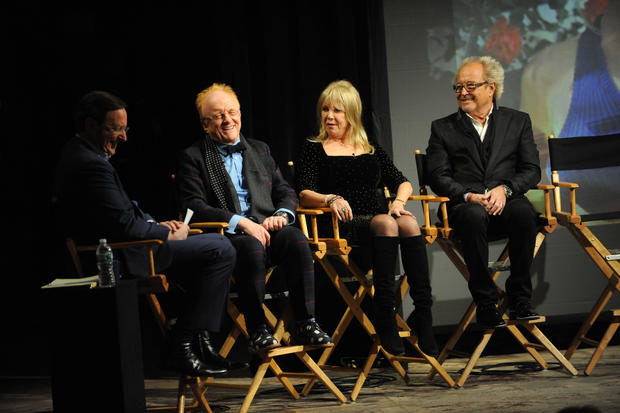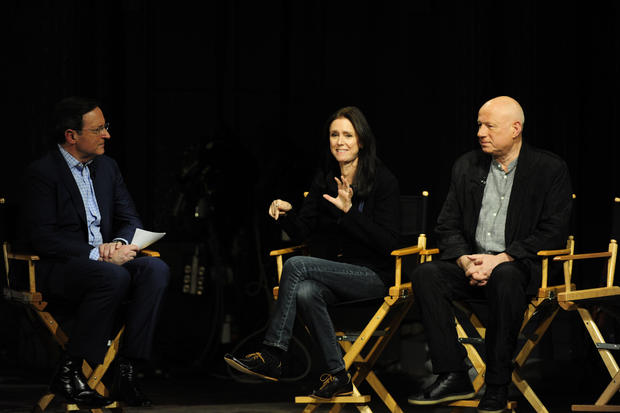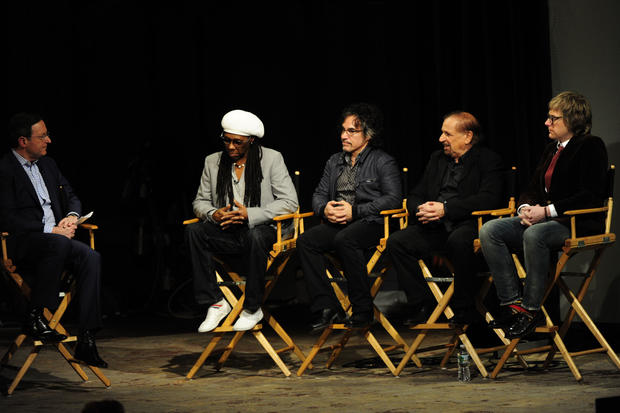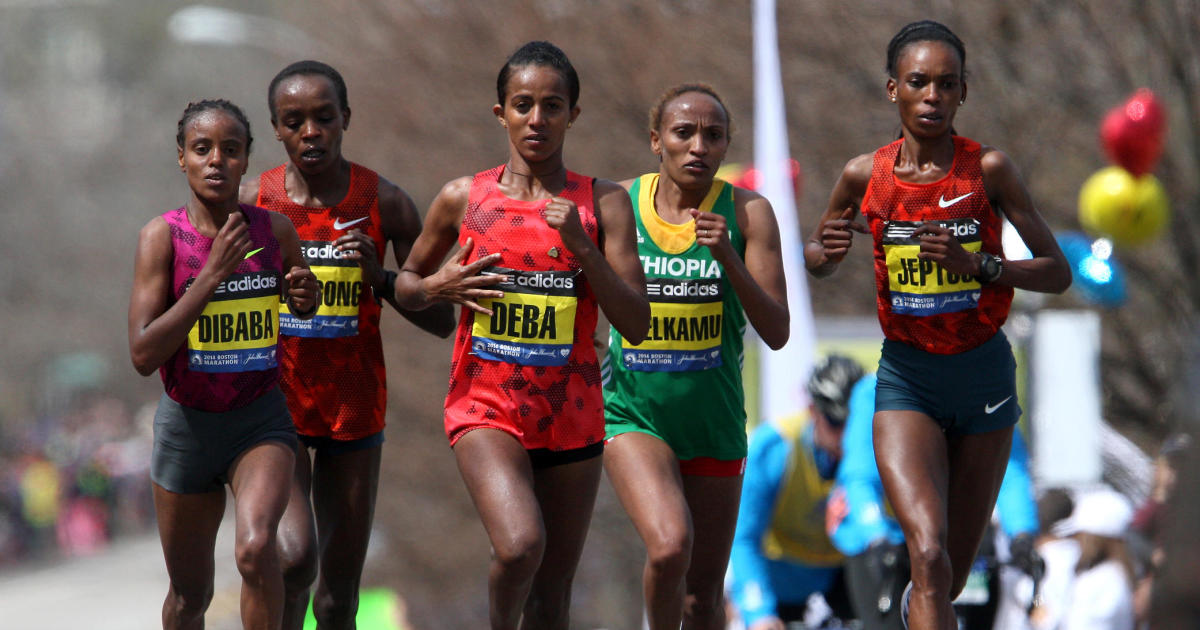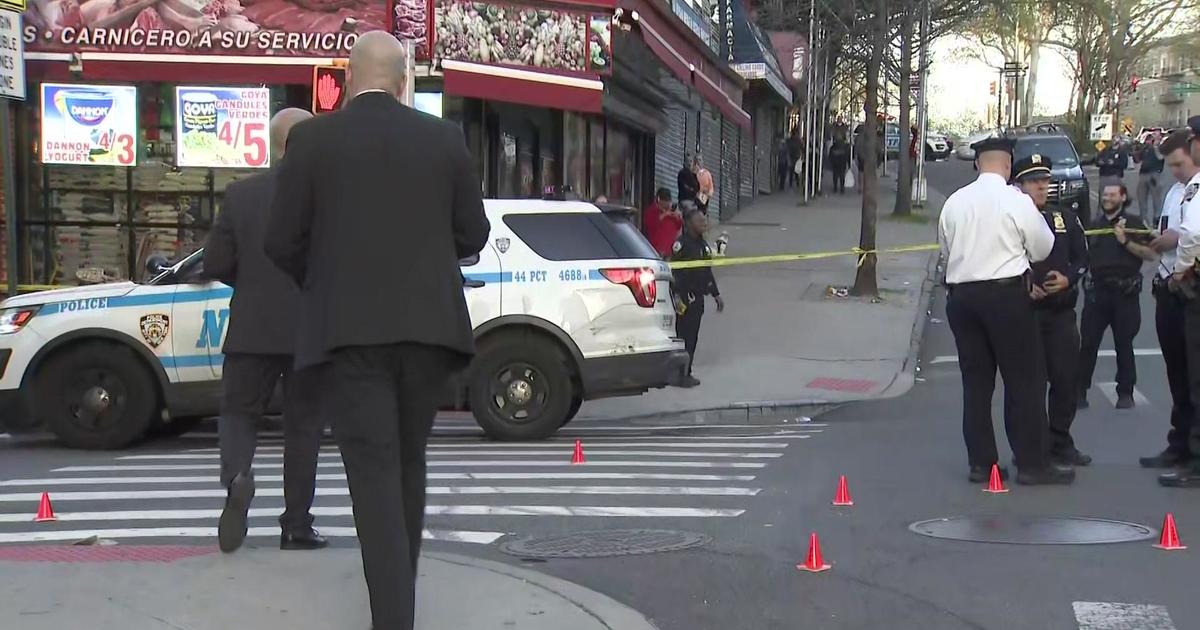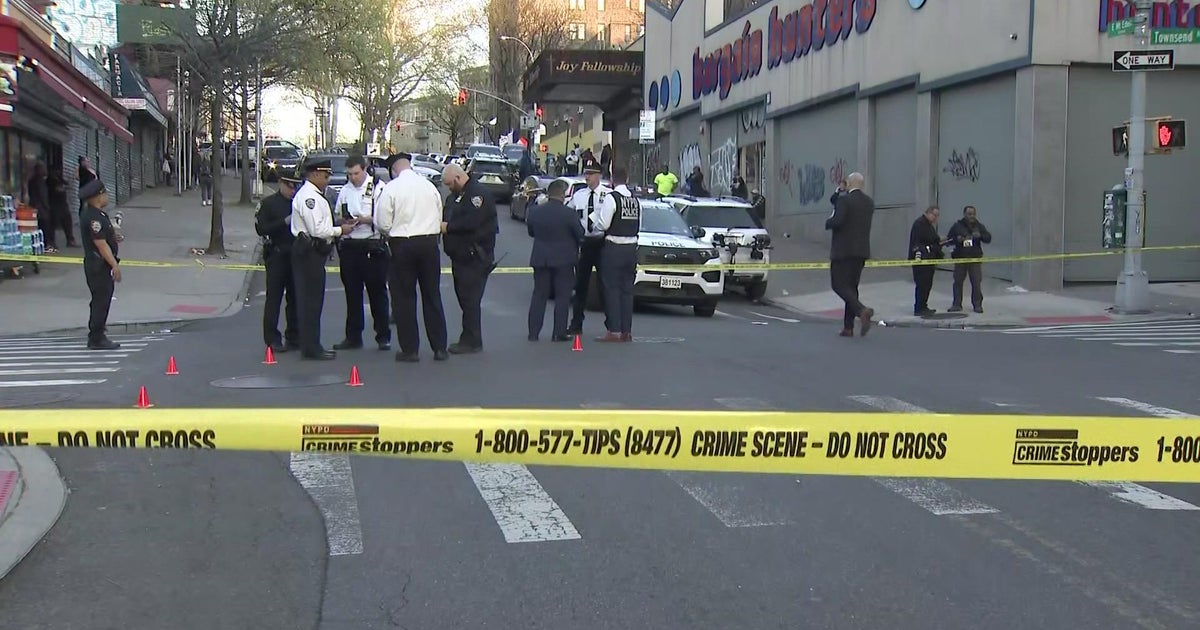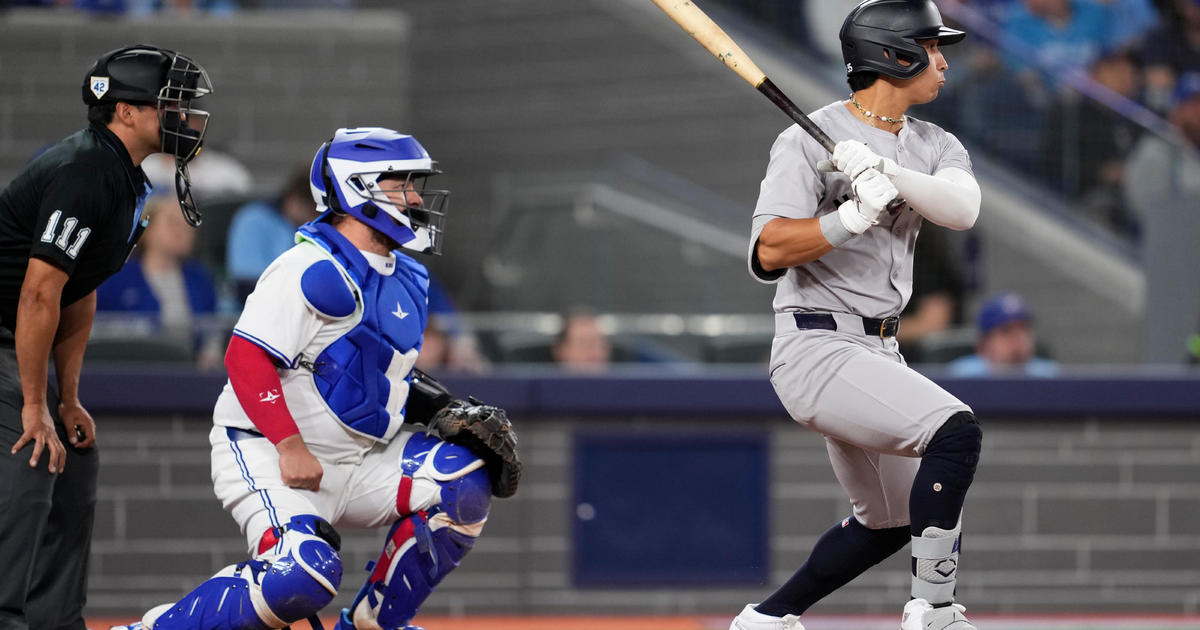Panel Looks Back 50 Years After Beatles' Iconic 'Ed Sullivan Show' Performance
NEW YORK (CBSNewYork) -- Fifty years ago Sunday, four young men from Liverpool, England took the stage at the Ed Sullivan Show, performed four original songs and one number from "The Music Man," and changed history in one night.
At the very same Ed Sullivan Theater where that historic performance took place, a panel gathered Sunday night to talk about the Beatles – including three people who knew the Beatles personally in their early days, two who have interpreted their work in film in parody, and four more who represent the music industry from the 1960s to the present day.
PHOTOS: '50 Years: The Beatles' At The Ed Sullivan Theater
CBS News Senior Business Correspondent Anthony Mason was the host and moderator for "50 Years: The Beatles."
On Feb. 9, 1964, 73 million people watched the John Lennon, Paul McCartney, George Harrison and Ringo Starr perform on the Ed Sullivan Show. They opened with "All My Loving" and followed with "Till There Was You" from "The Music Man," and "She Loves You," and later returned to perform "I Saw Her Standing There" and "I Want to Hold Your Hand."
Within two months, the Beatles had the top five songs on the American charts, and 63 percent of records released in America were Beatles records.
Three notable people who knew the Beatles well at that time joined Mason to talk about the group's momentous rise to prominence.
Acclaimed music producer Peter Asher came to prominence alongside the Beatles as half of the duo Peter and Gordon, who scored their biggest hit the Lennon-McCartney song "A World Without Love." He was also the brother of McCartney's longtime girlfriend, Jane Asher, and McCartney lived in his family's home for a time.
Pattie Boyd was one of the most celebrated models of the 1960s, and married George Harrison after they met on the set of the 1964 Beatles film "A Hard Day's Night." After the couple divorced, Boyd was also married for 10 years to Eric Clapton.
And Mick Jones was one of the founding members of the classic 1970s band Foreigner, but became acquainted with the Beatles many years earlier when he played on a bill with them in France as a session guitarist for vocalist Sylvie Vartan.
Asher said he watched Lennon and McCartney write "I Want to Hold Your Hand" in his family's home, at the piano belonging to his mother, an oboe professor at the Royal Academy of Music.
"They sat side by side – interestingly, on the piano bench – there were no guitars in the room, and played 'I Want to Hold Your Hand' for first time anywhere, and asked me what I thought," Asher said. "I said I thought it was very good. It's really hard to know – I mean, one doesn't like to be pretentious about it, because it's only a pop song. But there is something magical about the moment of creation for something that extraordinary good. You think, you know, am I going a bit crazy or is it about the best song I've ever heard in my life, or possibly both?"
While the Beatles had grown into massive celebrities in the U.K. since their first recordings were released in 1962, they did not gain a foothold in the U.S. until Capital Records released "I Want to Hold Your Hand" in December 1963. Beatlemania took the U.S. by storm afterward.
It also took time for the Beatles to gain a major fan base in France, where Jones first encountered them before they had yet visited the U.S. But he himself described the Beatles in literally glowing terms.
"I was just dazzled I heard on side of the stage, and first night I saw them, it was like sort of a white light experience," Jones said. "They were so perfect; there was like an aura around them. They played for a full 40 minutes; they played 15 songs in that time. I wish I could get away with that."
But long before their first U.S. tour, the Beatles were hoping to win the affection of Americans, the panelists said.
"Going to America was the ultimate dream. I mean, one forgets that back then it wasn't easy to go. It was expensive. It was a really long way. You didn't go for a week in Florida as a holiday like they do now," Asher said. "There were a couple of hits (by British musicians) – Lonnie Donegan had a hit, Acker Bilk had a hit, Rolf Harris had a hit -- but they were kind of one-offs. America never really bought into our artists," Asher said. "And in this particular case – the exciting thing about it for the Beatles and for all of us is that success in America meant that you got to go there. None of us had ever been there. It was a magical land from movies and television, and great music."
Boyd first encountered the Beatles after they returned home to the U.K. following their inaugural American tour, and began filming "A Hard Day's Night."
"Initially I had gotten interview for this film part, but without realizing -- I thought it was an interview for a TV commercial, because I recognized the director whom I' d worked with before. And later on that day, my agent said I got a part in the Beatles film," she said. "I couldn't believe it. This was extraordinary. How did this happen? And I panicked, and said I never had any desire to be an actress. And they said, 'Don't worry, you only have to say one word – prisoners.'" I thought I could do that."
During the filming, Boyd caught the Harrison's eye, whom she went on to marry in 1966. She described the energy around the group as "high-energy and electric."
"They sparked off each other very quickly and very fast; very amusing; very witty, and it was wonderful to be in their presence," Boyd said.
The panelists also credited the Beatles and the British Invasion with reviving early rock and roll, and the work of artists such as Buddy Holly, Eddie Cochran, and Gene Vincent, as well as with popularizing contemporary rhythm and blues.
"It's one of the all-time great con acts of all time," Asher said. "We copied your music, did it differently, and sold it back."
Two more panelists – theater and film director Julie Taymor and musical and comedic icon Neil Innes – talked about the broader influence of the Beatles.
Taymor was the director of the 2007 film "Across the Universe," starring Jim Sturgess, Evan Rachel Wood, Joe Anderson and T.V. Carpio, which tells the story of the political and cultural tumult of the 1960s through Beatles songs. Innes joined Eric Idle of "Monty Python" fame to create the Rutles, a parody group that gained fame with the 1978 mockumentary "All You Need Is Cash."
Innes and his earlier comedic band, the Bonzo Dog Doo-Dah Band, appeared in the Beatles movie "Magical Mystery Tour," in 1967. He noted that their sense of humor was a part of the Beatles' appeal along with their music.
"They were funny guys. I mean, you know, all the sort of stuff in the press conferences – it's natural, and you get that from all the hard work they did in the clubs, living in the same room in the Rat Keller (in their early days performing in Hamburg), you get a bond, and then you almost know what somebody's going to say, and you bounce off it. It was a bit like improvisation – they were doing it in those days," Innes said.
Meanwhile, Taymor said repurposing Beatles music for new purposes was a challenge. She said Elliot Goldenthal, who did many of the arrangements for "Across the Universe," had said trying to cover Beatles' songs with the same arrangements as the original recordings resulted in "deathly" consequences. However, she said, the Beatles' work lends itself to creating new arrangements so that other artists can make the songs their own.
"They're such great – the individuals as lyricists and composers – John, Paul, George in particular, as well as Ringo on one song – but they're such great composers that other people can cover those songs and make it their own," Taymor said. "There are a lot of bands – there are a lot of songs from bands, where you don't like it when you don't hear the original. You don't like it as much. You can't get the original performer's version out of your head. But the Beatles -- those composers are so brilliant that an Aretha Franklin version of 'Let It Be' is very different than Paul's."
She added that the Beatles never stopped their creative process, veering far from the pop hits about boy-girl romance of their early days to sounds ranging from proto-metal to vaudeville parody, and from Indian classical music to tape loop collages.
"They used the orchestra – even backwards – and (producer) George Martin and all his contribution – they didn't stop. They kept going and creating. It was something that is really admirable, and something that all artists want to do, is not to get stuck in one sound and one way," Taymor said.
And Innes credited the Beatles with helping define a century of history.
"I think at the time that was like, you know, why we're here tonight is because it was one of the major events of the 20th Century, along with two world wars, the atom bomb, and a bit of Frank Sinatra and Elvis," he said.
The final four panelists Sunday evening emphasized the power of the Beatles in generations of music.
Panelist Nile Rodgers was a co-founder of the Chic, and has been a producer for acts ranging from Diana Ross to Daft Punk. John Oates is best known as half of the rock and soul duo Hall & Oates. Felix Cavaliere came to prominence with the Young Rascals – later just known as the Rascals – in the 1960s, and Tad Kubler is the guitarist for the contemporary indie rock band the Hold Steady.
Rodgers said the Beatles redefined the very essence of what it meant to be a music recording artist.
"They changed the entire paradigm," he said. "Prior to the Beatles, most artists were getting their songs from the Brill Building and songwriters and stuff like that. After the Beatles came on the scene, it changed the way we all thought."
The panelists also called the Beatles pioneers for their recording techniques – even though the analog equipment they used is considered primitive by today's standards.
"Anyone who is making records owes a debt of gratitude to the Beatles, and George Martin in particular," Oates said. "What they pioneered on analog tape really transferred into today's digital world."
Added Kubler, "Anybody who goes into a recording studio, whether it's three tracks, or four, or eight, or now you can do 126 tracks if you want – you still go back to those records, and I think they had an enormous impact on anybody that wanted to record music."
Cavaliere said the Beatles – and their Ed Sullivan Show appearance in 1964 – brought many people the encouragement to embark on musical careers themselves. He said he had worked with the Beatles in Europe prior to their arrival in the U.S. and was aware of them, but was blown away when they came to the U.S.
"When they were playing our music – and by our music, collectively, I'm talking about American R&B – they were OK. But when they played their music, it was just magical. It was like, 'What is that?' You know, it was the way they were doing their chord structures and timing – it didn't make any sense," Cavaliere said. "But you know, that night just reinforced the fact that, 'Yeah, I can do this. I'd like to do this. I think all of us would like to do this,' because they were a band."
In their later years, the Beatles also become pioneers with studio experimentation, the panel said. Joining the discussion, Asher said no one recording in a studio could get away with turning up a Fairchild amplifier all and finding out it would not blow up, until the Beatles did it.
"They realized they should ignore the rules and do whatever they wanted, and that applied to the studio and their musical development in general – working class, sort of cheeky, we-can-try-anything attitude," he said.
Asher said in their sophisticated experimentation, the Beatles broke down stereotypes – being young, working-class men from the north of England.
"Important things were supposed to be done by upper-class, middle-aged, proper grown-ups in London, and suddenly, these people had the nerve to recognize their own self-importance," he said.
And Rodgers said the Beatles' "A Day in the Life" was the first song he learned on guitar, after he recognized the sheer cultural impact of the Beatles from an 11-year-old schoolmate. He found the girl, whom he described as one of the smartest in class, screaming at the TV.
"After it was over, she explained the whole appearance to me intellectually. She broke it down and she said, 'You know, Nile, we're on the threshold -- and she was putting on a full English accent. We were living in the serious hood in L.A., and she puts on this faux English accent and she says, 'You know, Nile, we're actually on the threshold of something very important happening musically,'" Rodgers said.
The Beatles went on to make multiple appearances on the Ed Sullivan Show through 1965. They stopped live tours in 1966, but went on to make some of their most iconic albums – "Sgt. Pepper's Lonely Hearts Club Band," the White Album, "Abbey Road" and "Let It Be" – before disbanding in 1970.
Lennon was assassinated outside his home in the Dakota Building at 72nd Street and Central Park West in 1980, and Harrison died after a battle with cancer in 2001.
Starr and McCartney -- now 73 and 71, respectively -- rarely play together. But they reunited for a concert broadcast on CBS Sunday night – along with an array of pop stars who gained fame in the past and present – to celebrate the 50 years since their first Ed Sullivan appearance.
Check Out These Other Stories From CBSNewYork.com:
